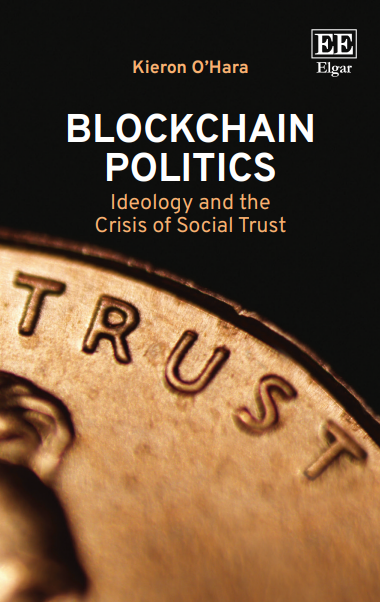Norms, the Elites and the Defence of the Realm
Posted on 03/03/25 in Politics, Trust

In my forthcoming book Blockchain Politics, I try to debunk the excessive pessimism of a recent book review by The Economist’s Free Exchange columnist. The reviewer was impressed by the book’s case, but “For all the striking statistics in the book, the author does not offer an especially rousing call to arms.” Why not? Because she demanded norm changes and “it is doubtful that governments can do all that much to alter social norms, just as they hold little responsibility for the fact that they changed in earlier decades,” while “knowledge of what produces successful adults is most useful to individuals planning their own lives.”
This is an extraordinary argument. These statements are of course true, but incredibly the reviewer appears to believe that between state and citizen there is nothing that affects norms at all; if people don’t spontaneously shift en masse, and if government coercion is powerless, all options are exhausted. But there are plenty of institutions, associations and little platoons in the private sphere between state and citizen that are immensely influential. If these are allowed to flourish, not whittled away by attacks on freedom of association and incursions of the public sector into the private, then their good influence may grow.
Perhaps even more importantly, let us remember the enormous influence on social norms of teachers, college educators, social researchers and journalists (including the Free Exchange reviewer). If these people are impressed or persuaded by an argument, and cease to promote policies discredited by the evidence, that would be very helpful. If they were to do it in sufficient numbers, in schools, colleges and the media, it might actually help to shift the norm in the direction urged by the evidence. That’s how an intellectual community is supposed to work within civil society.
That doesn’t guarantee that norms will shift in the right direction, but it can only help. The liberal elite has often acted as a vanguard for social attitudes more widely, often to the detriment of society as a whole, as long-cherished institutions, traditions and behaviours have been sidelined by new liberties and a general air of licence. If commentators were prepared to boost rather than undermine trust, to celebrate and defend their nations instead of critique them, and to make the good will of political opponents the default assumption, it may be that such attitudes, filtered through the media and social media, could diffuse through the population, undoing some of the damage of the culture wars.
As an example that is not explored in the book, let us take the defence of Western societies. This is a vital requirement; the defence dividend that followed the ending of the Cold War is no longer available. Services need to be upgraded, not only with high tech kit, but also – as the progress of the war in Ukraine has demonstrated – with people prepared to fight. There is a recruitment crisis in Europe, with a number of nations employing conscription and national service. Greater recruitment could have a number of positive effects, including the socialisation and training of a diverse cohort of young people within an association supportive of mutual trust and trustworthiness, making them both valuable to and valued by wider society. Regimental structures could help re-establish pride in local communities, at a time when many feel ‘left behind’. One way of doing this is through the education system, perhaps restoring some of the cadet training programmes of past generations.
It would be an uphill struggle. No doubt it is not a magic bullet, but equally we have to ask whether today’s educationalists would be able, never mind willing, to convey messages about the importance of dedication and contribution, of national and local patriotism. They may prefer their culture wars. One recent article discussed “army recruitment advertisements that reject traditional conceptions of hegemonic military masculinity”. You would think that would please the left wing Puritans, but no: it was a bad thing because “discourses and practices positioning the army as less aggressive, less white and more female-bodied (perhaps even as progressive) serve to obscure militarized violence by repackaging it in a more palatable form”. One wonders whether the defence of the realm could ever be palatable to the author.
 Kieron O'Hara
Kieron O'Hara